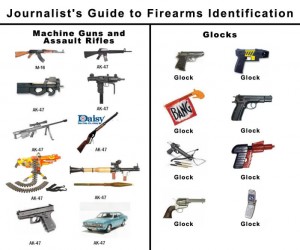Monthly Archives: July 2012
Guns, Ignorance, and Fear
My heart goes out to the families who lost loved ones in Aurora, Colorado this weekend. The kind of fear, pain, and horror their loved ones experienced in that theater, and the kind of fear, pain, and horror they are experiencing now in the aftermath have no place in a civilized world.
The urge to do something, anything, to prevent such a thing from ever happening again is a powerful and worthy one.
Like all such situations, allowing ignorance and fear to guide us in our decision-making is a bad idea.
I’ve been reading and reading and reading the internet’s response to the incident in Aurora and I see a lot of ignorance and fear that lead to statements I disagree with and which are, often, just plain wrong. The people making these statements are probably acting in good faith. They just don’t know what they’re talking about.
One of the best responses to most of the anti-gun arguments being raised can be found here at Larry Correia’s blog. I can’t add much to his words on the philosophical and legal side of the house.
However, there’s one aspect to this whole discussion that has bugged me more than any other: the idea that a CCW license holder in that theater would have just made things worse.
Idea 1: “A victim with a gun in that theatre would just have killed even more people with their wild shooting in the smoke and the darkness and the confusion.”
Wrong, and here’s why. Anyone with any familiarity with guns (I’m putting CCW holders in this group) won’t shoot unless they have a clear target and a clear backfield. In this case, if they didn’t have one because of the darkness or the smoke, they simply would not have fired their weapon until they did. You only see crazy undisciplined shooting in movie firefights, which is where the people raising the objection get their information about the use of guns.
Oh, terrorists and gangbangers also practice the “spray and pray” shooting style. Neither group equates, at all, with legal CCW holders, though most of the people objecting to the idea of defending oneself seem to conflate them.
Thus, if it were so dark, smoky, and confusing that a CCW holder would not have fired, we have no change in the outcome, certainly not a worse one. Psycho shoots who he will shoot.
Let’s say, however, that CCW holder did have a good shot. This takes us to…
Idea 2: “The shooter was wearing head-to-toe body armor so your pistols would not have worked. Duh, you scary-gun-people!”
Wrong again. People who get their information about the use of guns from the movies seem to imagine that this head-to-toe body armor granted Holmes invulnerability, the ability to walk unconcerned through gun fire like Arnie as the terminator.
Those of us who have some experience can tell you that being hit with a bullet while in body armor is like getting hit with a hammer while wearing a T-shirt. Not something you can ignore. While pistol bullets may not have penetrated his armor, they sure as hell would have gotten his attention, knocked him off balance, possibly even knocked him down. Those precious seconds while he was dealing with hammer blows would, unarguably, have saved lives.
Please, let’s not allow ignorance and fear to rule our decision-making about guns.
The Amazing Spider-Man
 I was not looking forward to this film when its marketing push first started. We already had one of these didn’t we? Good ones even.
I was not looking forward to this film when its marketing push first started. We already had one of these didn’t we? Good ones even.
And the actor playing Spider-Man looked like a goof. Especially his neck. I didn’t like the look of his neck. It was way too long.
Then as we got closer to the release of the movie and more story details crept out my ears perked up and it started sounding more interesting. As Lou Anders pointed out in a tweet there were details about this one that were ineffably right. Peter stayed in High School and had to deal with bullies and being a bully. He lived at home. He had a New York accent. His girlfriend was a blonde Gwen Stacy. He made his own web shooters. The list goes on. The film looked like it was staying far more true to the source material than others had.
Staying true to the source material is, of course, not a recipe for automatic success in a movie. It’s usually a recipe for disaster, books and comic books being so very different from film. But this one worked.
It worked well. I loved this movie. I will own it.
The acting was good. The action was good. The effects were good. It was all good.
Which makes me think about originality. How original can such a film be? Nothing about it was original. Not the story nor the characters nor the concept itself. It was a complete retread.
Yet I loved it. And I did not feel like I was watching something I had seen before.
It’s certainly possible to be unoriginal with something like this. It’s been done. Yet this one worked.
I think I’m starting to understand what Brandon Sanderson means when he says that originality for originality’s sake is vastly overrated.
Whatever you’re doing, do it well, and you’ll be fine.
Tangent Reviews Armored
It’s been too long and I simply must give a shout out to Tangent Online and Joe Giddings for reviewing Armored.
Mr. Giddings liked my story and said as much in his review , “In my opinion, the best story in the anthology.”
You made my day. Thanks, Joe!
Uniform on Display, A Response
 Myke Cole wrote an intriguing piece over on Jim C. Hines blog the other day.
Myke Cole wrote an intriguing piece over on Jim C. Hines blog the other day.
It was entitled Uniform in the Closet: Why Military SF’s Popularity Worries Me. In it Myke opined that there is a widening gap between the citizens of this nation and our military. Which is especially troubling when you consider the concept of the citizen soldier and how ubiquitous it has been until these recent phases of U.S. history. Military service members, current and former, are increasingly being considered a breed apart. Myke posits that Military SF’s growing popularity is really a manifestation of people’s fascination with the ‘other’ that the actual military is becoming in our culture.
I couldn’t agree more.
One reason for that growing separation is the fact that so few of our nation’s citizens serve in the military. One reason for that, I think, is the legacy of the Vietnam war. So much political hay was made of the military during that period, so much of it blatantly negative propoganda that the stigma was ingrained into an entire generation and is being passed on today.
Returning vets in the 60s and 70s were greeted with everything from harsh words to oven cleaner in the eyes by so-called ‘peace activists.’ Today I have received almost universal thanks and compassion for my service, usually from people who would never ever consider serving themselves. Which is the very problem Myke describes.
“Love the soldier but hate the war” does nothing to help the reputation of the military as a whole since we are the one’s prosecuting the war that is being used as political leverage.
Myke talks about wearing one’s uniform in public. He’s right. It used to be common place. It isn’t anymore.
I myself have, in the past, been very annoyed when I saw soldiers trundling their luggage through the airport in uniform. American soldiers are all taught not to do that. Travel in civilian clothes, don’t draw attention to yourself or your mission. It is the baseline SOP to travel incognito.
When soldiers travel in uniform today most (not all) of them are doing it in the hopes that someone one will give them attention or buy them lunch. That pisses me off. Being in the service is not a license to beg or show off.
But if it became common place, sanctioned and encouraged by the military leadership for CONUS travel, all that would change.
Myke gives the two big reasons why it is discouraged: OPSEC and Force Protection.
OPSEC: If every single traveling soldier traveled in uniform it would be very difficult to draw any meaningful conclusions about operations or troop movements out of the noise. Frankly, the news organizations are more than capable of betraying all that anyway, not to mention the social networking sites.
We would lose nothing and perhaps, if Myke is right, gain a great deal by increasing the visible presence of our military in the general population. Certainly worth a try. (Though I am loathe to give up the comfort of traveling out of uniform)
Force Protection: If you are a soldier traveling CONUS incognito, you are less likely to be a target. The implication of this, of course, is that some other poor schmuck will end up being the target, probably a civilian. There is an argument to be made that this is the moral parallel of putting your bomb factory next to an orphanage.
If some bad actor wants to target Americans and would choose a soldier over a civilian, good. Make it easy for him to target a soldier instead of a civilian and see where that gets him. It’s our job to take those kind of risks so joe civilian doesn’t have to. Why then are we hiding ourselves among joe civilian on our home territory in hopes that the bad guys will choose someone else?
Of course, with our current crop of enemies, they’d much rather hit civilians than someone trained to defend themselves. Less risky that way.
I’m pleased as punch that Military SF is growing in popularity. I want to sell books and I can write that. I hope it’s not a sign of bad things to come. But it could easily be.

